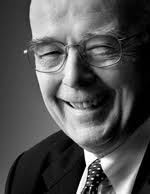
I have been a lawyer for almost forty years. I have had the good fortune of working on consequential matters in a variety of settings.
For more than 15 years, I also have taught law as an adjunct faculty member at several Bay Area law schools.
In my long career, I have never met the equal of San Francisco lawyer James Brosnahan.
To me and my family, Jim is unquestionably a hero. He stepped forward courageously and saved my son, John Lindh, in an hour of dire need.
John, My Muslim Son
John was and is still today an observant Muslim. Raised a Roman Catholic (my own faith), John converted to Islam in 1997, when he was 16 years old.
John is inquisitive, good-natured, studious and spiritual. He has a wry sense of humor.
After converting to Islam, while still a teenager, John committed himself to a program of serious study abroad, solidly within the Islamic scholarly traditions. He undertook to master the Arabic language, and the daunting challenging of learning to recite the entire Qur’an from memory.
I gladly and proudly supported John in all of these pursuits.
John is a good son and a devoted brother to his two siblings. He is compassionate towards those in need, and he has a kind disposition. He is respectful and curious about other cultures. His gift for language is exceptional.
Volunteer Soldier
In May 2001, without my knowledge, John took a path I wish he had not taken, but it was path that many others have taken too. He volunteered to become an infantryman in a country that was defending itself against forces that he perceived, with good reason, to be invasive and evil.
John enlisted as a foreign volunteer the Army of the Islamic Emirate of Afghanistan, which in the Spring of 2001 was under the control of the Taliban party. He has testified, nor have I ever doubted, that he was motivated entirely by sympathy for innocent people in Afghanistan, who were suffering at the hands of brutal Russian-backed warlords.
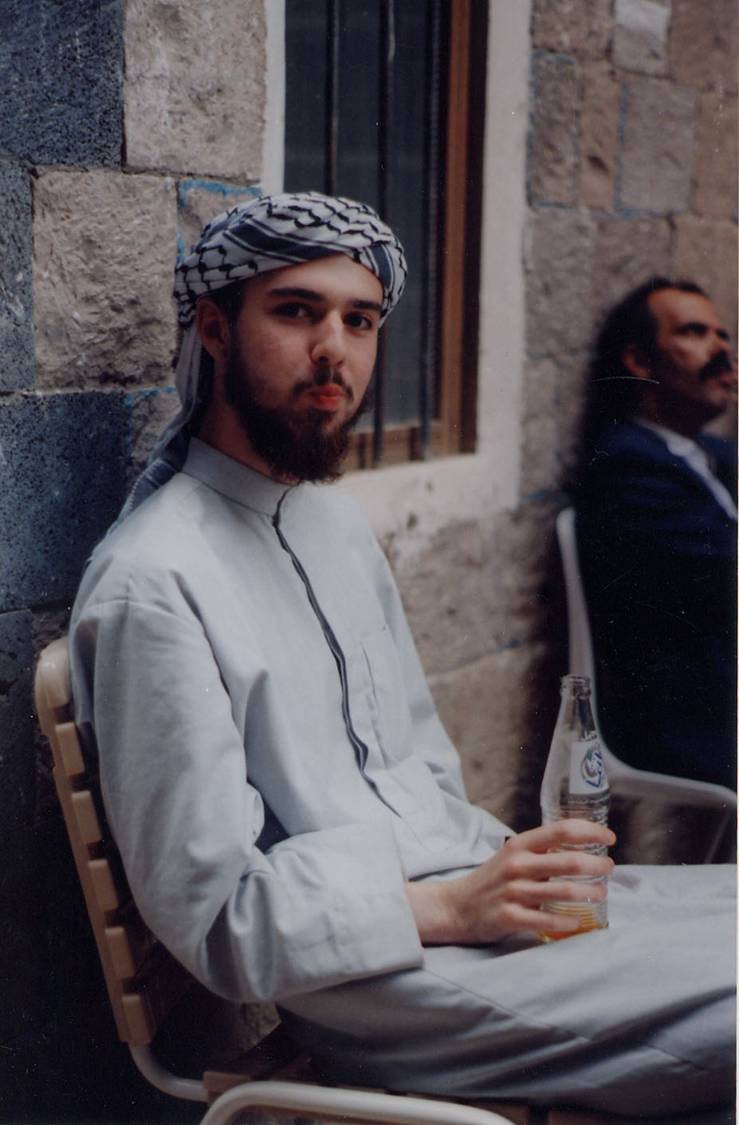
John’s decision was not some aberration. Many idealistic young Americans, over the course of our history, have made a similar choice, serving as volunteer soldiers in causes they felt were justified.
Several thousand Americans, for example, fought for the Republican side against Francisco Franco’s fascist uprising during the Spanish Civil War (1936-1939). Their heroism was immortalized by novelist Ernest Hemingway.
In the past few years, an unknown but not insubstantial number of American volunteers have served as soldiers in Ukraine, fighting against the Russian invasion. Among them is Conor Kennedy, grandson of the late Senator Robert F. Kennedy.[1]
Here’s another example: In a March 2024 essay in The New York Times, “What Would You Have Israel Do to Defend Itself?” columnist David Brooks disclosed in a parenthetical: “Readers should know that I have a son who served in the IDF [Israel Defense Forces] from 2014 to 2016; he’s been back home in the United States since then.”
In John’s case, the country he chose to help was Afghanistan, and the side to which he aligned himself was the Taliban, the de facto government of Afghanistan in 2001. The Taliban (the name means “student”) were an Islamist political party that rose up and managed to restore peace in the country, in the wake of a destructive, decade-long civil war among Afghan warlords.
Although people in the United States are accustomed to thinking of the Taliban as oppressive towards women, they virtually eliminated the crime of rape in Afghanistan, which had risen to barbaric proportions under the warlords.
The Afghan civil war came on the heels of the 1989 withdraw of the Soviet Union, which had invaded Afghanistan ten years earlier, in 1979.
America was not neutral in these events. Under Presidents Carter and Reagan, the United States was a principal supporter of the Afghan mujahideen, the resistance fighters against the Soviets. President Reagan was particularly vocal in his support. At the end of his acceptance speech for at the Republic National Convention in 1980, for example, then-candidate Reagan, departing from his prepared remarks, gave a shout-out to “the freedom fighters of Afghanistan” who were fighting the Soviets.[2]
Even as late as May 2001, the exact month when John went into Afghanistan, the Administration of George W. Bush was sending tens of millions of dollars in aid to the Taliban government. Then-Secretary of State Colin Powell announced at the time: “We will continue to look for ways to provide more assistance for Afghans[.]”[3]
Along with other foreign volunteers, virtually all of them Muslim, John received basic combat training in the Spring of 2001. In June 2001, he was dispatched to a location along the border between Afghanistan and Tajikistan, a very remote place. There, the Afghans were in a trench-warfare kind of stalemate against a group of warlords known as the Northern Alliance, who were backed by Russia.
John was issued the standard weapons of every infantryman, a rifle and two hand grenades. Although he was exposed to enemy fire from Northern Alliance snipers, he never engaged directly in combat, nor did he ever use any of his weapons. He was a cook and helper behind the lines.
We in John’s family had no inkling that he was in Afghanistan or had volunteered as a soldier there. His email correspondence, which had always been very regular, had lapsed abruptly and without explanation in late April. We were anxiously worried about John, and clueless as to his whereabouts.
America’s Reaction to the Horrors of September 11, 2001
Months after John went to Afghanistan, on September 11, 2001, the United States was subjected to the worst terrorist attack in history. Commercial airlines filled with passengers were commandeered and flown by suicide squads into the World Trade Center in New York City and the Pentagon near Washington, D.C. A third commandeered plan was destroyed in rural Pennsylvania after passengers bravely fought hand-to-hand against the hijackers.
Over three thousand innocent Americans were killed.
Aspects of the trauma were captured by the author Joyce Carol Oates in a short story called “The Mutants,” published in The Observer in December 2001.It described the harrowing circumstances of a young woman near Ground Zero in lower Manhattan. The author wrote: “Whoever their enemies were, these enemies had struck. Perhaps there would be more explosions. In other cities.”
Roughly a month later, the United States, with broad support among the American people, invaded Afghanistan, for the express purpose of toppling the Taliban government and replacing it with a new regime.
The rationale for the American invasion and occupation of Afghanistan was that the planners of the 9/11 terror attack, led by Osama bin Laden, had used bases in Afghanistan to secretly plan and launch the attack.
But this was not to be a “clean” war. It was approached as a dirty war, in which the Geneva Conventions were largely cast aside by the American invaders and their proxy forces among the warlords of Afghanistan.[4]
Surviving a Massacre
In November of 2001, under at least the watch if not the active command of American Special Forces, as many as 5,000 Taliban prisoners of war were murdered by their captors in the vicinity of Mazar-I-Sharif in northern Afghanistan. It was likely the largest massacre of prisoners of war by the U.S. and its proxy forces in our history.[5]
On Saturday morning, December 1, 2001, my attention was captured by a New York Times article by Carlotta Gall, a distinguished British journalist, describing in graphic terms the suffering of a group of 80 Taliban prisoners. Almost miraculously, they had survived a week of brutal suppression following an aborted uprising by the Taliban prisoners at an old fortress called Qala-Jangi, on the outskirts of the city of Mazar-i-Sharif in Northern Afghanistan.
Luke Harding, another respected British journalist, later observed that the Northern Alliance warlord and the American and British special forces at the Qala Jangi fortress “had only one plan: to kill all those in the compound.” Those who perished there, he wrote, "suffered a cold terrifying and squalid extinction.”[6]
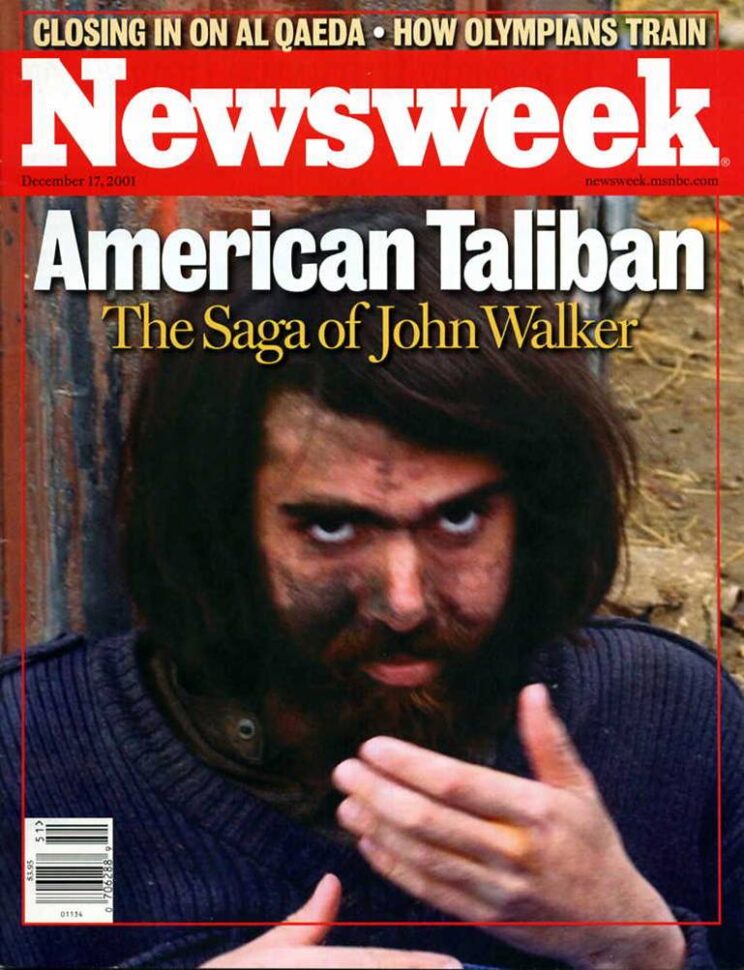
Later on Saturday evening, John’s mother and I learned from my cousin (who read it in a story posted on the internet) that our son John was among the wounded and traumatized survivors described in The Times article. He had been shot and punctured by shrapnel. We had no information as to his well-being or exact whereabouts, only that he was now in American custody.
We were gravely concerned for John’s welfare, not only because of the brutality at Qala Jangi, but also because we could readily anticipate that John was in grave peril of vengeance back here at home.
By Sunday, the story had broken as a sensation in all the media, including national television and the press. John quickly became labeled “The American Taliban.”
Jim Brosnahan Takes the Case
At 10:00 the next morning – Monday, December 3, 2001 (my birthday, as it happened) – I met with Jim Brosnahan at his law firm’s offices in the Financial District in San Francisco.
I rode into San Francisco that morning on the BART train. Standing at the rear of the car (in total anonymity – a luxury that was not destined to last the next 24 hours), I was able to observe dozens of passengers intently reading their morning newspapers, under bold headlines describing the unlikely discovery of a young American teenager among a group of Taliban prisoners in Afghanistan.
I felt dread. Among other concerns, I did not know the seriousness of John’s injuries, nor how he was faring mentally after the ordeal at Qala Jangi. But I was not overcome by this feeling of dread. I was comforted, knowing that I was on my way to see Jim Brosnahan.
I had encountered Jim roughly six months earlier, in my capacity at that time as an in-house lawyer at PG&E. I was a part of a group of California parties, including the California Attorney General, who were suing a Texas-based company we accused of manipulating natural gas prices in California and helping to trigger the catastrophic California Energy Crisis of 2001-2002.
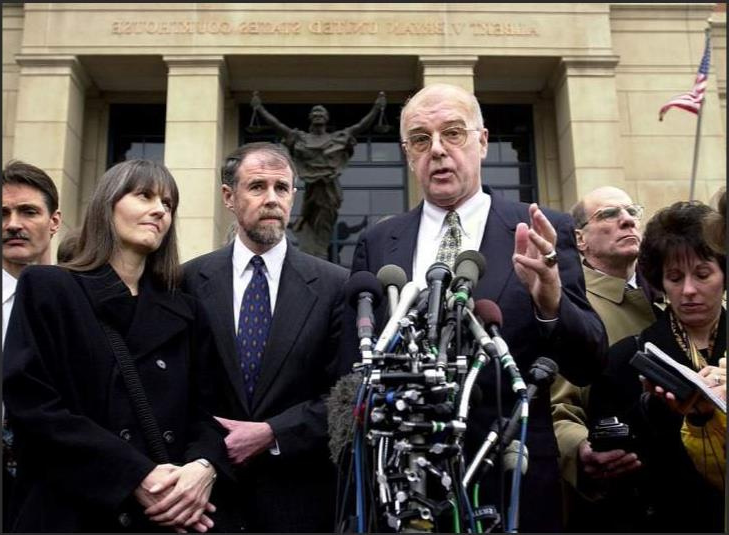
Jim Brosnahan arrived to participate in a settlement conference. He was representing the Texas company.
Until that settlement conference, I had had no prior familiarity with Jim Brosnahan. Only afterwards did I learn, from my colleagues back at PG&E, that Brosnahan was a legend in the San Francisco legal community and a renowned trial lawyer with a national reputation.
But despite not having known of Brosnahan before meeting him at the settlement conference, and even though we met as opponents, I was really impressed by his forceful presence and his obvious integrity. He was remarkable.
So, on Sunday the second of December, 2001, after learning that John had been found in Afghanistan among the Taliban prisoners, I called Jim Brosnahan’s office. I left him a voicemail message, explaining briefly who I was and why I was calling. Within less than an hour, Jim called me back and asked me to come by and see him on Monday morning.
Jim was eager to take the case. It seemed to appeal to his Irish-American sensibility of sympathy for the underdog. He took my word that John was a decent young man, essentially spiritual and apolitical. He has absolutely no affinity nor tolerance for terrorism or suicide attacks, which he believes to be strictly forbidden by Islam. Jim understood instinctively that this was a commendable young American on a spiritual journey abroad, who had already suffered greatly, and who faced enormous legal peril ahead.
Jim later described John in private as “the kid who kept the family car out past midnight, times a million.”
As I left Brosnahan’s office that December day, he “put up his dukes” in mock imitation of an Irish boxer, and said to me, with a twinkle in his eye, but with dead seriousness in the same moment: “I am a fighter.”
I felt that a huge burden had been removed from me and my family. Now we had an advocate in John’s corner, and a worthy advocate indeed.
"Given these circumstances, Jim Brosnahan certainly had his hands full, to a degree that few trial lawyers have ever encountered."
Prejudicial Commentary about John by Public Officials
The first thing Jim Brosnahan did was to send a letter to the Secretary of Defense and the Attorney General, informing them that he was representing John as his attorney. His letter request that he and John’s parents be given “safe passage” so that we could visit John.
John’s mother and I also sent letters to John via the Red Cross, to let him know we were aware of his circumstances, and that we had hired Jim to represent him.
These letters were ignored by the government.
Instead, beginning almost immediately, we faced a deluge of exceedingly prejudicial commentary by ranking members of the Bush Administration and other public figures.
Then-President George W. Bush, for example, stated in an Oval Office interview on December 21, 2001: “Obviously, Walker is unique in that he’s the first American Al Qaeda fighter that we have captured.”[7]
His father, former President George H.W. Bush, appearing on Good Morning, America with his wife, former First Lady Barbara Bush, said of John: “He’s just despicable. I thought of a unique penalty. Make him leave his hair the way it is and his face as dirty as it is and let him go wandering around this country and see what kind of sympathy he would get.”
To my ears, the former President’s statement sounded ominously like an invitation to a lynching.
Hillary Clinton, then a Senator from New York, stated on Meet the Press on December 11, 2001, that John was “a traitor.” I called her office he next morning to complain. Surely, I thought, at the Yale Law school where Mrs. Clinton was educated, do they not teach the students that it is improper for a public official to pronounce a conclusion about a case before the facts are known?
Bush’s Secretary of Defense, Donald Rumsfeld, seized on John’s case as a propaganda opportunity by designating John as “Detainee 001” in the government’s “War on Terror.” Rumsfeld spoke repeatedly about John in false and prejudicial ways. An especially egregious example was when he told the press that my son had been “captured by U.S. forces with an KK-47 in his hands.” In fact, John was disarmed and his hands were tied behind his back when he encountered U.S. troops. It appears certain that the Secretary, who undoubtedly had access to this information, deliberately misspoke.
Then-Speaker of the House Dennis Hastert (later sent to prison for sexual abuse of teenage boys as young as fourteen years of age) said that John was “a terrorist” who belonged to “an organization that took American lives and came against the American Constitution.”
Senator John McCain said, “I’d like to take him to Ground Zero and show him Ground Zero and see how he feels after that.”
Then-New York Mayor Rudy Giuliani, who was Time Magazine’s “Person of the Year in December 2001, said of John on December 16, 2001: “When you commit treason against the United States of America, particularly at a time when the U.S. is in peril of attack and further attack, I believe the death penalty is the appropriate remedy to consider.”
Some of the most prejudicial and unethical commentary came from Attorney General John Ashcroft, the nation’s top prosecutor. Ashcroft held two nationally televised press conferences to announce the filing of criminal charges against John. At the first press conference, on January 15, 2002, the Attorney General said: “We may never know why he turned his back on our country and our values, but we cannot ignore that he did. Youth is not absolution for treachery, and personal self-discovery is not an excuse to take up arms against one’s own country.” In his second press conference, on February 2, 2002, Ashcroft said: “Americans who love their country do not dedicate themselves to killing Americans.”
General Colin Powell – who as Secretary of State had personally announced the Bush Administration’s generous grant of millions of dollars in aid to the Taliban government of Afghanistan just a few months earlier, in May 2001 – said that John “brought shame upon his family.”
I think it’s fair to say that in our nation’s history, no American citizen facing criminal charges before a jury has ever suffered anything close to this barrage of unfounded and prejudicial statements by the highest officials of the government.
The jury pool in the entire United States was poisoned by this toxic commentary and by the prejudicial coverage of John’s case in the press, which continually referred to him as a “terrorist.” An Associated Press poll found that John’s name was a household word nationwide, and that the only difference between liberal Americans and conservative Americans was that most liberals felt he should be sentenced to life imprisonment, while the conservatives thought he should be put to death.
Given these circumstances, Jim Brosnahan certainly had his hands full, to a degree that few trial lawyers have ever encountered.
A Vigorous Defense, Based on the Innocence and Egregious Abuse of the Accused
In the end, the government’s overblown case against John “collapsed,” to borrow a term that both The Boston Globe and The New Yorker used to describe how the case ended.
Having alleged sensational “terrorism” charges against John, the government agreed to drop all of them. The only charge remaining was that John had violated the government’s economic sanctions on the Taliban government of Afghanistan that were in effect in 2001.
For this offense, and because John had carried weapons (namely, his infantryman’s rifle and two hand grenades) in the commission of the sanctions violation, John was required, in return, to accept a harsh 20-year prison sentence.
A commentator at the Hoover Institution at Stanford University called this “a petty prosecution” that was “unworthy of a great country.”
Even though I do not believe anyone in the government honestly believed that John was a “terrorist” or a terrorism sympathizer, I also realize that the government did act out of gregariousness in agreeing to dismiss all the terrorism-related charges against John.
The reason for the “collapse” of the government’s case against my son was not altruism or a sudden awakening to the prospect of injustice. The reason was that Jim Brosnahan put forward a powerful case, supported by vivid evidence, that John was an innocent young man who had been egregiously and mercilessly abused by U.S. military personnel.
On December 7, 2001, wounded and still suffering from the effects of the week-long ordeal at Qala Jangi, John was flown to Camp Rhino, a U.S. Marine base approximately 70 miles south of Kandahar. His bullet wound and shrapnel wounds were deliberately left untreated., even though there were medical personnel on hand who could have attended to them. The Marines at the base taunted and threatened him. He was stripped naked, and bound in the cold with painful plastic restraints tightly wound around his wrists, and duct tape wrapped around his chest, arms, and ankles. He was blindfolded and locked in an unheated metal shipping container for two days, shivering uncontrollably in the bitter cold. Soldiers outside pounded on the sides, threatening to kill him.
All of this mistreatment, in plain violation of the Geneva Conventions and of any standards of decency, appears to have been carried out in response to a written command from then-Secretary of Defense Rumsfeld, who directed the military to “take the gloves off” in their interrogation of John.
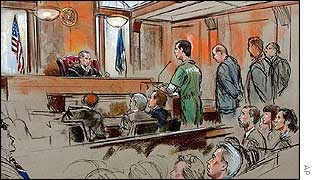
Jim Brosnahan and the other members of the defense team rigorously documented the abuse. They assembled a substantial number of military personnel who had witnessed it. On a Monday morning, July 15, 2002, John’s lawyers were ready to present these witnesses and evidence in open court. But when the judge appeared in the courtroom, a plea bargain that had been reached on Sunday evening was announced. The hearing was canceled.
Frankly, I was glad that John’s sister, my then-middle-school-age daughter, was spared the trauma of graphic testimony about how the U.S. Marines had mercilessly abused her brother.
Three months later, on October 4, 2002, John returned to the court for sentencing. For the first time, he was afforded an opportunity to speak in his own defense. He said, “I went to Afghanistan with the intention of fighting against terrorism and oppression.” He was motivated, he said, by a sense of religious duty. He condemned terrorism as “completely against Islam.” He said: “I have never supported terrorism in any form and never would.”
Jim Brosnahan stood fearlessly by my son’s side as he made his statement. I will never forget Jim’s strong and calming presence. My son wept as he spoke.
John served nearly 18 years in federal prison. With credit for good behavior, he was released in May 2019. He is now married and living peacefully. Remarkably, John still retains his equanimity and his good humor.
I am keenly mindful John’s freedom today would not be possible, were it not for the extraordinary courage, moral clarity, and ability of Jim Brosnahan.
James Brosnahan is a giant of the legal profession, not just in San Francisco but in the nation as a whole.
We will always need lawyers of Brosnahan’s caliber, when people in positions of power – be they George Bush, or Hillary Clinton, or Rudy Giuliani – or, for that matter, Donald Trump – lose their way.
[1] “Conor Kennedy, the Grandson of Robert F. Kennedy, says he secretly enlisted to fight in Ukraine,” CBS News (Oct. 21, 2002, available at: https://www.cbsnews.com/news/conor-kennedy-says-enlisted-ukraine-robert-f-kennedy-grandson-taylor-swift-ex-boyfriend/
[2] Ronald Reagan, Republican National Convention Acceptance Speech, July 17, 1980, available at: https://www.reaganlibrary.gov/archives/speech/republican-national-convention-acceptance-speech-1980 (visited February 10, 2025).
The version of the speech published by the Reagan Presidential Library at the link above concludes with the statement and the prefatory language reproduced below:
At the end, Reagan departed from his prepared text:
I have thought of something that is not a part of my speech and I’m worried over whether I should do it. Can we doubt that only a divine providence placed this land, this island of freedom, here as a refuge for all those people in the world who yearn to breath freely: Jews and Christians enduring persecution behind the Iron Curtain, the boat people of Southeast Asia, of Cuba and of Haiti, the victims of drought and famine in Africa, the freedom fighters of Afghanistan and our own countrymen held in savage captivity [emphasis supplied].
I'll confess that I’ve been a little afraid to suggest what I’m going to suggest. I’m more afraid not to.
Can we begin our crusade joined together in a moment of silent prayer?
God Bless America.
[3] U.S. Department of State Archive (May 17, 2001), available at: https://2001-2009.state.gov/secretary/former/powell/remarks/2001/2928.htm
(visited February 10, 2025).
[4] See Jane Mayer, The Dark Side: The Inside Story of How the War on Terror Turned Into a War on American Ideals (2008). Mayer’s book, a finalist for the National Book Award, included a chapter on my son John’s case, which was a reproduction of an article she originally published in The New Yorker magazine.
[5] See Newsweek Magazine, The Death Convoy of Afghanistan (2002), available at: https://www.newsweek.com/death-convoy-afghanistan-144273 (visited February 10, 2025). See also The New York Times, Tues. Dec. 11, 2001 (lead story on page 1), “Witnesses Say Mamy Taliban Died in Custody,” by Carlotta Hall. My son also wrote about the massacre after his release from prison: John Lindh, The Guantanamo Bay Internment Camp is an Unresolved Vestige of the American Occupation of Afghanistan (The Intercept, September 11, 2021), available at: https://theintercept.com/2021/09/11/afghanistan-guantanamo-prison-taliban/.
[6] Luke Harding, The Siege of Masar-I-Sharif, Granta Magazine (Spring 2002).
[7] For several weeks after John’s rescue in Afghanistan, various U.S. government officials incorrectly referred to him as “John Walker” or “Walker.” John’s correct surname is Lindh. My son’s full name is John Phillip Waler Lindh.
